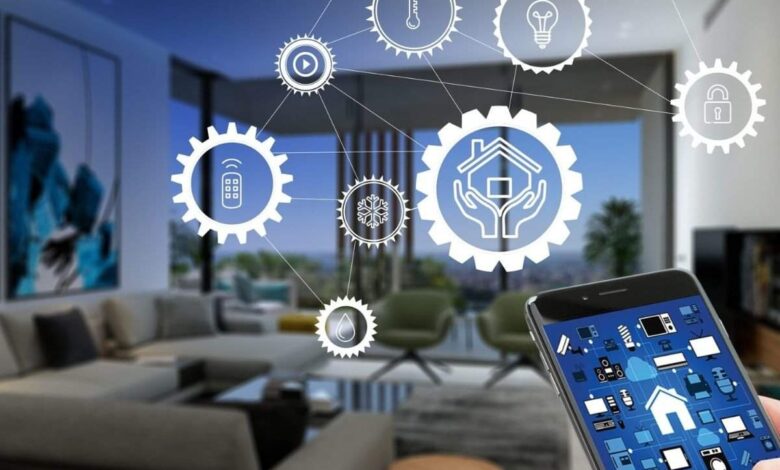Smart Home System: The Future of Residential Safety

The rise of intelligent home systems and technological advancements have caused a considerable evolution in the idea of home safety over time. Modern householders benefit from having access to a plethora of cutting-edge tools and innovations that not only improve their living conditions but also push the boundaries of home safety. In this piece, we investigate how smart home systems have revolutionized home security, looking at the main elements, advantages, and potential future developments of this new industry. Keeping our home secure can be a lot of work so search for wireless intruder alarms UK.
A Smart Home: What Is It?
A smart house is a residence that utilizes devices that are connected to the internet to enable remote surveillance as well as management of appliances as well as systems, such as lighting and heating. Intelligent technology for homes offers consumers security, comfort, the sake of simplicity, and environmental sustainability by enabling them to control automated appliances, typically through a smart home app regarding their smartphones or another page-established relationships device. It is also known as home automation, or demotics, compared to the Latin word domes, implication home.
How Does Technology For Smart Homes Operate?
A home with smart technology isn’t just an assortment of various smart appliances and gadgets; rather, it’s a network of interconnected gadgets that can be controlled from a distance.
A master automated home controller, also known as a smart home hub, controls every device, including lighting, controls for thermostats, and security systems, including appliances. This hardware hub, which can sense, analyze, and transmit wirelessly, serves as the brains of the smart home system. It unifies all of the different apps through a single, remotely controllable smart home app for consumers. Wink Hub, Google Home, and Amazon Echo are a few instances of examples of smart home hubs. Certain smart home gadgets rely on wireless protocols like Z-Wave or Zigbee while many others use both Bluetooth and Wi-Fi for connectivity to the intelligent home network.
Parts of Smart Home Security:
As a comprehensive defence against emergencies, burglaries, and intruders, automated security systems for homes are an essential part of household safety. Among the essential elements of home security systems that are smart are:
- Smart cameras: Real-time monitoring and recording of activities anywhere on or around a property is made possible by high-definition cameras that come with sensors that detect movement, night vision, and two-way audio.
- Smart door locks: These cutting-edge locks, which enable homeowners to manage and keep an eye on access to their properties from anywhere, offer improved security and convenience through keyless entry, remote management, and customizable access codes.
- Motion sensors: When they detect movements, wireless motion sensors can set off automated actions like lighting up or sounding alarms, or they can detect suspicious activities and send out alerts, notifications, or both.
- Smart Alarms: Integrating burglary alarm systems that are outfitted with lights that strobe, warning sounds, and connections to monitoring services offer deterrents against emergencies or invasions as well as instant alerts.
Advantages of Smart Home Security:
Installing home security systems that are smart has several advantages for homeowners, such as:
- Enhanced Protection: By reducing the chance of theft, break-ins, and property damage, home security systems that are smart offer preventative surveillance, real-time warnings, and quick reaction capabilities.
- Remote Observing and Control: Consumers can enjoy flexibility and peace of mind by remotely watching over and managing their security systems using web-based applications as well as smartphone apps.
- Deterrent Effect: The obvious appearance of smart security equipment, such as motion sensors, cameras, and alarms, discourages would-be burglars and lowers the risk of security lapses.
- Integration alongside Other Systems: To create a smooth and networked home environment, intelligent security systems for homes can be combined with other connected gadgets and systems, among them voice assistants, heating and cooling systems, and lights.
Emerging Trends in Intelligent Home Safety:
While technology advances, novel developments and patterns will continue to influence smart security in homes throughout the future.
Read also: How to Make the Perfect Waffles Recipe at Home?
- Algorithms developed using machine learning are used by powered by artificial intelligence intelligent home appliances to evaluate data, identify trends, and forecast possible security risks. This allows for proactive reactions and individualized protection solutions.
- Biometric Authentication: To improve access control and authentication procedures, smart home security systems are integrating advanced biometric methods for authentication including recognition of voices, fingerprinting scanning, and facial recognition.
- Internet of Things Environments and Compatibility: As the Internet of Things (IoT) environments and standards proliferate, there is a greater chance of interoperability and compatibility amongst smart home gadgets, which facilitates smooth integration and interaction between various platforms and systems.
Final Words:
Smart home systems as a whole which offer cutting-edge technologies and creative ways to safeguard homeowners and their properties, are the residential safety of the future. In an increasingly computerized and networked environment, homes can improve safety, deterrent, and peace of mind by utilising smart security equipment, integrated systems, and monitoring via the internet capabilities.



